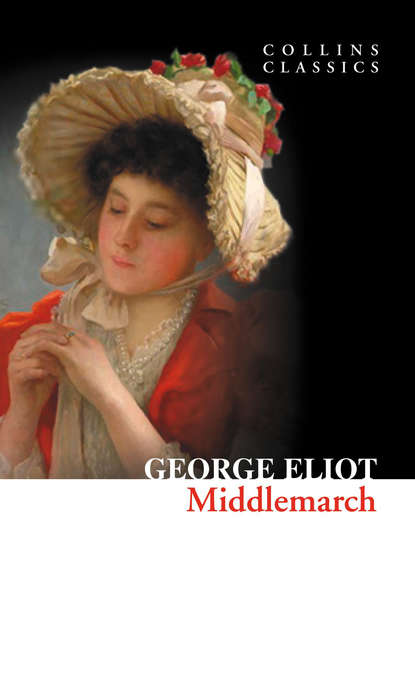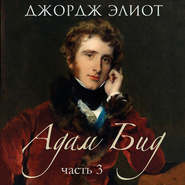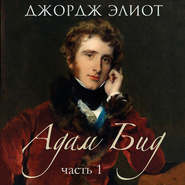По всем вопросам обращайтесь на: info@litportal.ru
(©) 2003-2024.
✖
Middlemarch
Настройки чтения
Размер шрифта
Высота строк
Поля
It was three o’clock in the beautiful breezy autumn day when Mr Casaubon drove off to his Rectory at Lowick, only five miles from Tipton; and Dorothea, who had on her bonnet and shawl, hurried along the shrubbery and across the park that she might wander through the bordering wood with no other visible companionship than that of Monk, the Great St Bernard dog, who always took care of the young ladies in their walks. There had risen before her the girl’s vision of a possible future for herself to which she looked forward with trembling hope, and she wanted to wander on in that visionary future without interruption. She walked briskly in the brisk air, the colour rose in her cheeks, and her straw-bonnet (which our contemporaries might look at with conjectural curiosity as at an obsolete form of basket) fell a little backward. She would perhaps be hardly characterised enough if it were omitted that she wore her brown hair flatly braided and coiled behind so as to expose the outline of her head in a daring manner at a time when public feeling required the meagreness of nature to be dissimulated by tall barricades of frizzed curls and bows, never surpassed by any great race except the Fijian. This was a trait of Miss Brooke’s asceticism. But there was nothing of an ascetic’s expression in her bright, full eyes, as she looked before her, not consciously seeing, but absorbing into the intensity of her mood, the solemn glory of the afternoon with its long swathes of light between the far-off rows of limes, whose shadows touched each other.
All people, young or old (that is, all people in those ante-reform times), would have thought her an interesting object if they had referred the glow in her eyes and cheeks to the newly-awakened ordinary images of young love: the illusions of Chloe about Strephon have been sufficiently consecrated in poetry, as the pathetic loveliness of all spontaneous trust ought to be. Miss Pippin adoring young Pumpkin and dreaming along endless vistas of unwearying companionship, was a little drama which never tired our fathers and mothers, and had been put into all costumes. Let but Pumpkin have a figure which would sustain the disadvantages of the short-waisted swallow-tail, and everybody felt it not only natural but necessary to the perfection of womanhood, that a sweet girl should be at once convinced of his virtue, his exceptional ability, and above all, his perfect sincerity. But perhaps no persons then living—certainly none in the neighbourhood of Tipton—would have had a sympathetic understanding for the dreams of a girl whose notions about marriage took their colour entirely from an exalted enthusiasm about the ends of life, an enthusiasm which was lit chiefly by its own fire, and included neither the niceties of the trousseau, the pattern of plate, nor even the honours and sweet joys of the blooming matron.
It had now entered Dorothea’s mind that Mr Casaubon might wish to make her his wife, and the idea that he would do so touched her with a sort of reverential gratitude. How good of him—nay, it would be almost as if a winged messenger had suddenly stood beside her path and held out his hand towards her! For a long while she had been oppressed by the indefiniteness which hung in her mind, like a thick summer haze, over all her desire to make her life greatly effective. What could she do, what ought she to do?—she, hardly more than a budding woman, but yet with an active conscience and a great mental need, not to be satisfied by a girlish instruction comparable to the nibblings and judgments of a discursive mouse. With some endowment of stupidity and conceit, she might have thought that a Christian young lady of fortune should find her ideal of life in village charities, patronage of the humbler clergy, the perusal of Female Scripture Characters, unfolding the private experience of Sara under the Old Dispensation, and Dorcas under the New, and the care of her soul over her embroidery in her own boudoir—with a background of prospective marriage to a man who, if less strict than herself, as being involved in affairs religiously inexplicable, might be prayed for and seasonably exhorted. From such contentment poor Dorothea was shut out. The intensity of her religious disposition, the coercion it exercised over her life, was but one aspect of a nature altogether ardent, theoretic, and intellectually consequent; and with such a nature struggling in the bands of a narrow teaching, hemmed in by a social life which seemed nothing but a labyrinth of petty courses, a walled-in maze of small paths that led no whither, the outcome was sure to strike others as at once exaggeration and inconsistency. The thing which seemed to her best, she wanted to justify by the completest knowledge; and not to live in a pretended admission of rules which were never acted on. Into this soul-hunger as yet all her youthful passion was poured; the union which attracted her was one that would deliver her from her girlish subjection to her own ignorance, and give her the freedom of voluntary submission to a guide who would take her along the grandest path.
‘I should learn everything then,’ she said to herself, still walking quickly along the bridle road through the wood. ‘It would be my duty to study that I might help him the better in his great works. There would be nothing trivial about our lives. Everyday-things with us would mean the greatest things. It would be like marrying Pascal. I should learn to see the truth by the same light as great men have seen it by. And then I should know what to do, when I got older: I should see how it was possible to lead a grand life here—now—in England. I don’t feel sure about doing good in any way now: everything seems like going on a mission to a people whose language I don’t know;—unless it were building good cottages—there can be no doubt about that. Oh, I hope I should be able to get the people well housed in Lowick! I will draw plenty of plans while I have time.’
Dorothea checked herself suddenly with self-rebuke for the presumptuous way in which she was reckoning on uncertain events, but she was spared any inward effort to change the direction of her thoughts by the appearance of a cantering horseman round a turning of the road. The well-groomed chestnut mare and two beautiful setters could leave no doubt that the rider was Sir James Chettam. He discerned Dorothea, jumped off his horse at once, and, having delivered it to his groom, advanced towards her with something white on his arm, at which the two setters were barking in an excited manner.
‘How delightful to meet you, Miss Brooke,’ he said, raising his hat and showing his sleekly-waving blond hair. ‘It has hastened the pleasure I was looking forward to.’
Miss Brooke was annoyed at the interruption. This amiable baronet, really a suitable husband for Celia, exaggerated the necessity of making himself agreeable to the elder sister. Even a prospective brother-in-law may be an oppression if he will always be presupposing too good an understanding with you, and agreeing with you even when you contradict him. The thought that he had made the mistake of paying his addresses to herself could not take shape: all her mental activity was used up in persuasions of another kind. But he was positively obtrusive at this moment, and his dimpled hands were quite disagreeable. Her roused temper made her colour deeply, as she returned his greeting with some haughtiness.
Sir James interpreted the heightened colour in the way most gratifying to himself, and thought he never saw Miss Brooke looking so handsome.
‘I have brought a little petitioner,’ he said, ‘or rather, I have brought him to see if he will be approved before his petition is offered.’ He showed the white object under his arm, which was a tiny Maltese puppy, one of nature’s most naive toys.
‘It is painful to me to see these creatures that are bred merely as pets,’ said Dorothea, whose opinion was forming itself that very moment (as opinions will) under the heat of irritation.
‘Oh, why?’ said Sir James, as they walked forward.
‘I believe all the petting that is given them does not make them happy. They are too helpless; their lives are too frail. A weasel or a mouse that gets its own living is more interesting. I like to think that the animals about us have souls something like our own, and either carry on their own little affairs or can be companions to us, like Monk here. Those creatures are parasitic.’
‘I am so glad I know that you do not like them,’ said good Sir James. ‘I should never keep them for myself, but ladies usually are fond of these Maltese dogs. Here, John, take this dog, will you?’
The objectionable puppy, whose nose and eyes were equally black and expressive, was thus got rid of, since Miss Brooke decided that it had better not have been born. But she felt it necessary to explain.
‘You must not judge of Celia’s feeling from mine. I think she likes these small pets. She had a tiny terrier once, which she was very fond of. It made me unhappy, because I was afraid of treading on it. I am rather short-sighted.’
‘You have your own opinion about everything, Miss Brooke, and it is always a good opinion.’
What answer was possible to such stupid complimenting?
‘Do you know, I envy you that,’ Sir James said, as they continued walking at the rather brisk pace set by Dorothea.
‘I don’t quite understand what you mean.’
‘Your power of forming an opinion. I can form an opinion of persons. I know when I like people. But about other matters, do you know, I have often a difficulty in deciding. One hears very sensible things said on opposite sides.’
‘Or that seem sensible. Perhaps we don’t always discriminate between sense and nonsense.’
Dorothea felt that she was rather rude.
‘Exactly,’ said Sir James. ‘But you seem to have the power of discrimination.’
‘On the contrary, I am often unable to decide. But that is from ignorance. The right conclusion is there all the same, though I am unable to see it.’
‘I think there are few who would see it more readily. Do you know, Lovegood was telling me yesterday that you had the best notion in the world of a plan for cottages—quite wonderful for a young lady, he thought. You had a real genus, to use his expression. He said you wanted Mr Brooke to build a new set of cottages, but he seemed to think it hardly probable that your uncle would consent. Do you know, that is one of the things I wish to do—I mean, on my own estate. I should be so glad to carry out that plan of yours, if you would let me see it. Of course, it is sinking money; that is why people object to it. Labourers can never pay rent to make it answer. But after all, it is worth doing.’
‘Worth doing! yes, indeed,’ said Dorothea, energetically, forgetting her previous small vexations. ‘I think we deserve to be beaten out of our beautiful houses with a scourge of small cords—all of us who let tenants live in such sties as we see round us. Life in cottages might be happier than ours, if they were real houses fit for human beings from whom we expect duties and affections.’
‘Will you show me your plan?’
‘Yes, certainly. I dare say it is very faulty. But I have been examining all the plans for cottages in Loudon’s book, and picked out what seem the best things. Oh, what a happiness it would be to set the pattern about here! I think, instead of Lazarus at the gate, we should put the pig-sty cottages outside the park-gate.’
Dorothea was in the best temper now. Sir James, as brother-in-law, building model cottages on his estate, and then, perhaps, others being built at Lowick, and more and more elsewhere in imitation—it would be as if the spirit of Oberlin had passed over the parishes to make the life of poverty beautiful!
Sir James saw all the plans, and took one away to consult upon with Lovegood. He also took away a complacent sense that he was making great progress in Miss Brooke’s good opinion. The Maltese puppy was not offered to Celia; an omission which Dorothea afterwards thought of with surprise; but she blamed herself for it. She had been engrossing Sir James. After all, it was a relief that there was no puppy to tread upon.
Celia was present while the plans were being examined, and observed Sir James’s illusion. ‘He thinks that Dodo cares about him, and she only cares about her plans. Yet I am not certain that she would refuse him if she thought he would let her manage everything and carry out all her notions. And how very uncomfortable Sir James would be! I cannot bear notions.’
It was Celia’s private luxury to indulge in this dislike. She dared not confess it to her sister in any direct statement, for that would be laying herself open to a demonstration that she was somehow or other at war with all goodness. But on safe opportunities, she had an indirect mode of making her negative wisdom tell upon Dorothea, and calling her down from her rhapsodic mood by reminding her that people were staring, not listening. Celia was not impulsive: what she had to say could wait, and came from her always with the same quiet, staccato evenness. When people talked with energy and emphasis she watched their faces and features merely. She never could understand how well-bred persons consented to sing and open their mouths in the ridiculous manner requisite for that vocal exercise.
It was not many days before Mr Casaubon paid a morning visit, on which he was invited again for the following week to dine and stay the night. Thus Dorothea had three more conversations with him, and was convinced that her first impressions had been just. He was all she had at first imagined him to be; almost everything he had said seemed like a specimen from a mine, or the inscription on the door of a museum which might open on the treasures of past ages; and this trust in his mental wealth was all the deeper and more effective on her inclination because it was now obvious that his visits were made for her sake. This accomplished man condescended to think of a young girl, and take the pains to talk to her, not with absurd compliment, but with an appeal to her understanding, and sometimes with instructive correction. What delightful companionship! Mr Casaubon seemed even unconscious that trivialities existed, and never handed round that small-talk of heavy men which is as acceptable as stale bride-cake brought forth with an odour of cupboard. He talked of what he was interested in, or else he was silent and bowed with sad civility. To Dorothea this was adorable genuineness, and religious abstinence from that artificiality which uses up the soul in the efforts of pretence. For she looked as reverently at Mr Casaubon’s religious elevation above herself as she did at his intellect and learning. He assented to her expressions of devout feeling, and usually with an appropriate quotation; he allowed himself to say that he had gone through some spiritual conflicts in his youth; in short, Dorothea saw that here she might reckon on understanding, sympathy, and guidance. On one—only one—of her favourite themes she was disappointed. Mr Casaubon apparently did not care about building cottages, and diverted the talk to the extremely narrow accommodation which was to be had in the dwellings of the ancient Egyptians, as if to check a too high standard. After he was gone, Dorothea dwelt with some agitation on this indifference of his; and her mind was much exercised with arguments drawn from the varying conditions of climate which modify human needs, and from the admitted wickedness of pagan despots. Should she not urge these arguments on Mr Casaubon when he came again? But further reflection told her that she was presumptuous in demanding his attention to such a subject; he would not disapprove of her occupying herself with it in leisure moments, as other women expected to occupy themselves with their dress and embroidery—would not forbid it when—Dorothea felt rather ashamed as she detected herself in these speculations. But her uncle had been invited to go to Lowick to stay a couple of days: was it reasonable to suppose that Mr Casaubon delighted in Mr Brooke’s society for its own sake, either with or without documents?
Meanwhile that little disappointment made her delight the more in Sir James Chettam’s readiness to set on foot the desired improvements. He came much oftener than Mr Casaubon, and Dorothea ceased to find him disagreeable since he showed himself so entirely in earnest; for he had already entered with much practical ability into Lovegood’s estimates, and was charmingly docile. She proposed to build a couple of cottages, and transfer two families from their old cabins, which could then be pulled down so that new ones could be built on the old sites. Sir James said, ‘Exactly,’ and she bore the word remarkably well.
Certainly these men who had so few spontaneous ideas might be very useful members of society under good feminine direction, if they were fortunate in choosing their sisters-in-law! It is difficult to say whether there was or was not a little wilfulness in her continuing blind to the possibility that another sort of choice was in question in relation to her. But her life was just now full of hope and action: she was not only thinking of her plans, but getting down learned books from the library and reading many things hastily (that she might be a little less ignorant in talking to Mr Casaubon), all the while being visited with conscientious questionings whether she were not exalting these poor doings above measure and contemplating them with that self-satisfaction which was the last doom of ignorance and folly.
CHAPTER 4 (#ulink_b5db42e0-f129-5da5-a623-4955b6c58dd8)
1st Gent. ‘Our deeds are fetters that we forge ourselves.’
2nd Gent. ‘Ay, truly: but I think it is the world
That brings the iron.’
‘Sir James seems determined to do everything you wish,’ said Celia, as they were driving home from an inspection of the new building-site.
‘He is a good creature, and more sensible than any one would imagine,’ said Dorothea, inconsiderately.
‘You mean that he appears silly.’
‘No, no,’ said Dorothea, recollecting herself, and laying her hand on her sister’s a moment, ‘but he does not talk equally well on all subjects.’
‘I should think none but disagreeable people do,’ said Celia, in her usual purring way. ‘They must be very dreadful to live with. Only think! at breakfast, and always.’
Dorothea laughed. ‘O Kitty, you are a wonderful creature!’ She pinched Celia’s chin, being in the mood now to think her very winning and lovely—fit hereafter to be an eternal cherub, and if it were not doctrinally wrong to say so, hardly more in need of salvation than a squirrel. ‘Of course people need not be always talking well. Only one tells the quality of their minds when they try to talk well.’
‘You mean that Sir James tries and fails.’
‘I was speaking generally. Why do you catechise me about Sir James? It is not the object of his life to please me.’
‘Now, Dodo, can you really believe that?’
‘Certainly. He thinks of me as a future sister—that is all.’ Dorothea had never hinted this before, waiting, from a certain shyness on such subjects which was mutual between the sisters, until it should be introduced by some decisive event. Celia blushed, but said at once:—
‘Pray do not make that mistake any longer, Dodo. When Tantripp was brushing my hair the other day, she said that Sir James’s man knew from Mrs Cadwallader’s maid that Sir James was to marry the eldest Miss Brooke.’















